
PENSACOLA, Florida — Gulf Power’s commitment to provide renewable energy to its customers took another step forward today when employees announced the filing of a new pilot program that will become the first community solar program in Northwest Florida. The program was created to address customer interest in supporting environmentally friendly renewable energy.
Gulf Solar Energy Share, once approved by the Florida Public Service Commission, will be a new, affordable way Gulf Power customers can support renewable energy without the expense of rooftop solar panels. The program is also a good fit for customers who want solar but their roof may not be ideal.
For an annual subscription fee of $99, customers can offset a portion of their traditional energy with solar and receive a monthly credit on their bill between $2 and $2.50. In addition, if participants agree to a five-year commitment, they will receive a reduced annual fee of $89. There are no additional installation fees or maintenance costs.
“Gulf Solar makes solar energy accessible to the average homeowner, renter or business owner,” said Rick DelaHaya, Gulf Power spokesperson. “And customers who participate in community solar will receive a monthly credit on their bill.”
Once approved, the 1-megawatt community solar photovoltaic facility will be built near Milton, Florida.
“This is a limited program and we expect it to fill up fast,” said DelaHaya. “We’re excited to bring more renewables to Northwest Florida and give customers a new option to participate in solar without having to install a costly system on their roof.”
Customers interested in Gulf Solar Energy Share can visit MyGulfPower.com for more information and to sign up for the Community Solar program.
If approved, this is the fourth solar project Gulf Power has initiated in Northwest Florida. In April, the Florida Public Service Commission approved the construction of three large-scale solar energy farms. Partnering with the U.S. Navy and U.S. Air Force, the solar farms will be constructed at Eglin Air Force Base, NAS Whiting Field, and NAS Saufley Field. When complete, the facilities could produce enough energy to power approximately 18,000 homes for one year.
Related